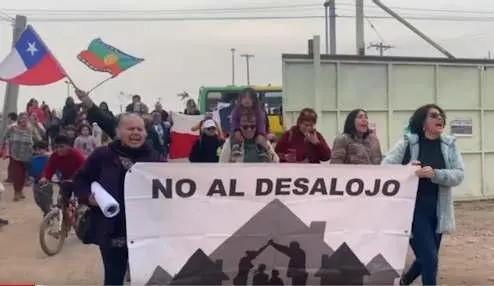
The Housing Struggle in Chile
Featured image: protesters against the eviction. Source: Periodico El Pueblo
Land occupations are called “tomas” or “campamentos” in Chile. Homelessness is a serious issue in Chile and ‘tomas’ and ‘campamentos’ have multiplied since 2019, reaching now a number of around 120.000 poor families living in ‘illegal’ land occupations all over the country. The old State responses in defense of the big landlords private property with judicial processes and eviction orders, besides a new repressive law that dictates prison sentences for land occupations.
The opportunist government of Boric was the one who promulgated that anti-people law. This is accompanied by a black media campaign in radio and TV presenting land occupations as ‘hotspots of crime’ and to justify the brutal actions by the police in the evictions.
One of the most important land occupations in current struggles is ‘Toma 17 de Mayo’, that now faces an eviction order.


The Habitat International Coalition has issued an Urgent Solidarity Action Call to stop the eviction order issued against Toma 17 de Mayo, Cerro Navia, Santiago, Metropolitan Region, Chile, and respond to the demands of more than two hundred families.
In this call the following is explained: “On October 2, 2023, the Supreme Court ordered the eviction of 11.3 hectares in the Santa Elvira sector of Cerro Navia, where more than 200 families have been living since May 2019 due to a lack of alternative housing. The occupation arose from a group of Cerro Navia neighbors who decided to occupy land that had been vacant for 20 years on the urban boundary of the commune. Neighbors with construction knowledge developed a plot plan prior to the occupation, and agreements between the new neighbors and the duties of each person when occupying the land were established.
In this case, the land belongs to the Guzmán-Nieto family, who own the most accumulated properties – land reserves – in the Santiago Metropolitan Region. Among their properties is the Santa Elvira Industrial Subdivision, part of the ENEA Business City logistics project, which aims to develop areas adjacent to the Santiago Airport and includes plans to construct multiple hotels and warehouses. Since 2019, the area has transformed into a self-built community called “Toma 17 de Mayo.” It is important to note that before the occupation, the land was completely unused, a vacant lot adjacent to Cerro Navia’s neighborhoods and a focal point for illegal landfills.
In the case of the Fundo Santa Elvira area, the Guzmán Nieto family has escalated the conflict with the occupiers, showing no interest in negotiating or reaching agreements since the beginning of this process. They have filed numerous legal actions against the families of the “Toma 17 de Mayo.” Initially, in 2019, they filed a protection appeal, which was unsuccessful.
In 2022, the family filed a complaint for nonviolent usurpation in the 5th Court of Guarantee, which is currently active. This complaint proposes precautionary measures associated with an order for the immediate abandonment of the occupied land by the accused, essentially criminalizing the occupying families. Simultaneously, the plaintiffs’ lawyer has proposed updating Chilean legislation on usurpation, further complicating the situation for the families living in Toma 17 de Mayo.
In addition to the previous process, a new Protection Appeal was filed against the residents in the Santiago Court of Appeals in August 20232 but it was rejected by the court.
With the approval and promulgation of the New Law on Usurpation, the Third Chamber of the Supreme Court3 ordered the eviction of Toma 17 de Mayo on October 2, 20234, which must be executed by April 24, 2024. This decision was made following a new presentation in court, utilizing the recently passed legislation to enforce the eviction order against the occupants of the disputed land.
This passage highlights the significant impact of the recent approval of the Law on Usurpations, popularly known as the “Anti-Toma Law” or “Damned Law,”5 on the legal process faced by the residents of Toma 17 de Mayo. The parliamentary debate on August 30, 2023, created a political dilemma for President Gabriel Boric’s government, and despite their efforts to soften the proposal, they only managed to safeguard existing settlements registered in the National Registry of Land Occupatios before March 2024 from the application of the “permanent flagrancy” concept, which would have allowed for the immediate eviction of all these occupations.”
Hence, the upcoming days will be challenging as promising. We will follow the development.

